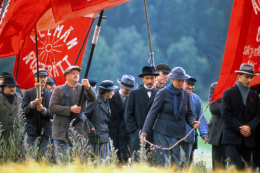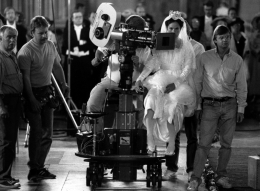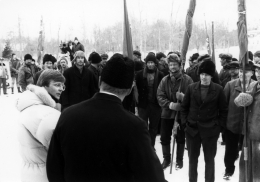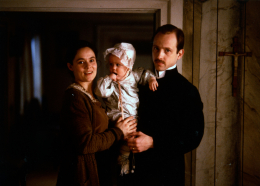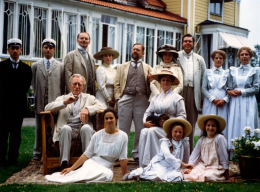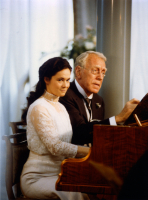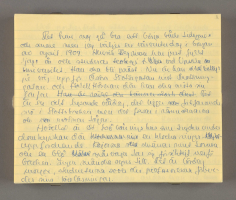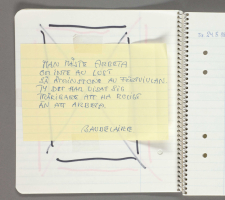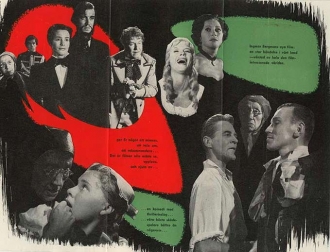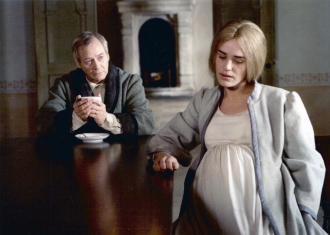The Best Intentions
First part of the trilogy about Bergman's parents continued with Sunday's Children and Private Confessions.
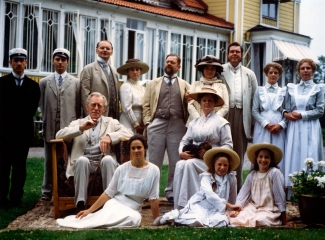
"[...] the amazing advantage from my point of view was that I made friends with both my father and my mother before they managed to disappear."Ingmar Bergman
About the film
The Best Intentions was the first cinematic spin-off from Bergman's openly autobiographical project which had begun in earnest with the publication of The Magic Lantern in 1987.
This story about Bergman's parents was directed by the Dane Bille August, best known internationally at the time for Pelle the Conqueror. It was originally made as a television series, from which a shorter film version was produced for cinema distribution. At a press conference prior to shooting in 1989, Bergman talked about the genesis of the script:
When I was writing my autobiography, or whatever you'd like to call it, 'The Magic Lantern', I spent a long time wandering, much more than ended up in the book, through the streets and settings of my childhood. The smells, the light... And in these settings I encountered my parents. Not the mystical figures I've already struggled with for so many years of my adult life, but two young people; a very impecunious theology student, Erik Bergman, who lived in dreadful student lodgings at a place known as The Seven Orifices of Hell, and a 20-year-old girl, who lived on the sedate and elegant Trädgårdsgatan. He, very poor, comes from extremely difficult circumstances. She is a much-loved, spoilt princess in a well-established middle class milieu surrounded by a large family. A father and mother who loved her. I met those two people, who started to impress themselves more and more on my memory, but who understood that they could not be in the biography, but that I would have to deal with them outside the biography, and (I) started, basically for the fun of it, to write and fantasise about them. The amazing advantage from my point of view was that I made friends with both my father and my mother before they managed to disappear. When mother had her first heart attack I often visited her in hospital and we spoke together and mother told me a little about her life and I thought it was extremely captivating and remarkable. I encountered my mother, not the mystical figure, the figure both loved and hated, no: I encountered a human being who told me about her early life and I asked her a great deal. Then mother died and father became a widower, and was a widower for four years.
During this period I had reason to meet him quite a lot, and we became friends, too. This (film) will not be about from the cradle to the grave – but concerns ten years of my parents lives. Ten important, decisive years, from 1909 when they met to the early summer of 1918 when this writer lies in his mother's womb and is ready to enter the world. As complicated as that proved... If I'd known it was so trying I'm not sure I would have (taken that step)! It's these ten years that it's about. These two people meet. It's almost classic: it turns out that her parents are utterly opposed to this relationship. Heart-rending, dramatic and sometimes violent conflicts ensue. And their marriage... At the start of this period they were obviously very happy together, but then strains are put on these two people the likes of which we can scarcely imagine. Both human and social.
Sources
- The Ingmar Bergman Archives.
Distribution titles
The Best Intentions (USA)
Las mejores intenciones (Spain)
The Best Intentions (Great Britain)
Die besten Absichten (Germany)
Con le migliori intenzioni (Italy)
Den gode vilje (Denmark)
Den gode viljen (Norway)
Hyvä tahto (Finland)
Les meilleures intentions (France)
Production details
Production country: Sweden, Germany, Great Britain, Italy, France, Denmark, Finland, Norway, Iceland
Distributor in Sweden (35 mm): Svensk Filmindustri, Swedish Film Institute
Laboratory: Sveriges Television Filmlaboratoriet
Production company: Sveriges Television AB Kanal 1, Zweites Deutsches Fernsehen, Radiotelevisione Italiana RaiDue, Société d'Engénérie et de Programmes de Télévision et d'Audio-Visuels, Danmarks Radio, Yleisradio Ab, Norsk Rikskringkasting, Ríkisútvarpið-Sjónvarpid (RÚV), Film Four International
Other company: Optical Vision
Aspect ratio: 1,66:1
Colour system: Colour
Sound system: Dolby Stereo
Original length (minutes): 181
Censorship: 131.435
Date: 1992-06-04
Age limit: 11 years and over
Length: 4967 metres
Release date: 1992-10-02, Riviera, Stockholm, Sweden, 181 minutes
Filmstaden, Uppsala; Sweden
Filming locations
Sweden
Filmhus Studios, Stockholm
Music
Title: Sinfonia concertante, violin, viola, orchestra, K. 364, Flat major
Composer: Wolfgang Amadeus Mozart
Title: Trumpet Volontary Alternative title: The Prince of Denmark's March
Composer: Jeremiah Clarke (1700)
Title: Gammal vals från Delsbo
Title: Den signade dag
Arrangement: Johan Olof Wallin (1812)
Lyrics: Johan Olof Wallin (1812)
Title: Geh aus, mein Herz, und suche Freud Alternative title: I denna ljuva sommartid
Composer: Nathan Söderblom (1916)
Lyrics: Paul Gerhardt (German lyrics 1653) Joachim von Düben (Swedish lyrics 1725) Christoffer Olofsson Angeldorff (Swedish lyrics 1855) Britt G. Hallqvist (Swedish lyrics1980)
Title: Nu ha vi ljus här i vårt hus
Alternative title: Julpolska
Composer: Johanna Ölander
Collaborators
- Samuel Fröler
- Pernilla August
- Max von Sydow
- Ghita Nørby
- Lennart Hjulström
- Mona Malm
- Lena Endre
- Keve Hjelm
- Björn Kjellman
- Börje Ahlstedt
- Hans Alfredson
- Lena T. Hansson
- Anita Björk
- Elias Ringqvist
- Ernst Günther
- Marie Göranzon
- Björn Granath
- Gunilla Nyroos
- Michael Segerström
- Sara Arnia
- Inga Landgré
- Emy Storm
- Marie Richardson
- Lena Brogren
- Tomas Bolme
- Ingalill Ellung
- Kåre Santesson
- Roland Hedlund
- Inga Ålenius
- Barbro Kollberg
- Björn Gustafson
- Eva Gröndahl
- Gösta Prüzelius
- Åke Lagergren
- Bertil Norström
- Margaretha Krook
- Sif Ruud
- Irma Christenson
- Mikael Bengtsson
- Pia Bergendahl
- Mats Pontén
- Dan Johansson
- Niklas Hald
- Marcus Ohlsson
- Leif Forstenberg
- Boel Larsson
- Kerstin Andersson
- Erika Ullenius
- Sara Sommerfeld
- Maja Sommerfeld
- Gustaf Hammarsten
- Ernst-Hugo Järegård
- Max Winerdal
- Sten Ljunggren
- Örjan Roth-Lindberg
- Tord Peterson
- Puck Ahlsell
- Sigge Nilsson
- Cecilia Lagerkvist
- Göran Walfridsson, Assistant Unit Manager
- Rasmus Rasmusson, Propman
- Anders Bergkvist, First Assistant Cameraman
- Carl-Axel Wikander, Construction Coordinator
- Martti Malkamaa, Construction Coordinator
- Charlotte Lesche, Second Assistant Cameraman
- Teddy Holm, Set Decorator
- Esa-Pekka Salonen, Musical Conductor
- Lars Stålberg, Gaffer
- Sven Ramström, Gaffer
- Jörgen Persson, Director of Photography
- Johann Zollitsch, Unit Manager
- Rolf Lindström, Camera Operator
- Catharina Gilljam, Assistant Film Editor
- Janus Billeskov Jansen, Film Editor
- Monica Larsson, Assistant Costume Designer
- Inger Eiserwall, Assistant Costume Designer
- Mary Blomgren, Assistant Costume Designer
- Ann-Mari Anttila, Costume Designer
- Ulf Darin, Supervising Sound Editor
- Owe Svensson, Supervising Sound Editor
- Lasse Ulander, Supervising Sound Editor
- Stefan Ljungberg, Supervising Sound Editor
- Lennart Gentzel, Production Mixer
- Johnny Ljungberg, Production Mixer
- Hans Rinning, Color Timer
- Stefan Nilsson, Music Composer
- Björn Linnman, Music Composer
- Anna-Lena Hansen, Painter / Scenic Artist
- Björn Fallström, Painter / Scenic Artist
- Kristofer Sjöström, Painter / Scenic Artist
- My Leffler, Painter / Scenic Artist
- Vördur Thorisson, Painter / Scenic Artist
- Lars Smedinge, Painter / Scenic Artist
- Frida Thofelt, Painter / Scenic Artist
- Claes-Göran Carlberg, Painter / Scenic Artist
- Alfonso Sangüesa, Painter / Scenic Artist
- Helen Johansson, Painter / Scenic Artist
- Conny Josefsson, Painter / Scenic Artist
- Alex Alsterlund, Painter / Scenic Artist
- Christina Jernström, Negative Cutter
- Stefan Eidin, Key Grip
- Anna-Lena Petersén, Press Agent
- Anne von Stapelmohr, Press Agent
- Ingrid Dahlberg, Producer
- Stefan Baron, Producer
- Elisabeth Liljeqvist, Production Manager / Production Coordinator
- Karin Brodahl-Persson, Production Secretary
- Lars Bjälkeskog, Project Leader
- Bille August, Director
- Lars Söderberg, Property Master
- Maria Håård, Property Master
- Kenneth Karlberg, Property Master
- Anna Asp, Production Designer
- Kaj Larsen, Assistant Production Designer
- Ann-Margret Fyregård, Assistant Production Designer
- Anna Klang, Assistant Production Designer
- Titti Mörk-Norén, Script Supervisor
- Sven Rex, Tailor
- Mary Ringenson Holst, Tailor
- Kjell Gustavsson, Make-up Supervisor
- Monica Kilpiö, Make-up Supervisor
- Catherine Ström, Make-up Supervisor
- Jan Eriksson, Carpenter
- Björn Ehrnborg, Carpenter
- Percy Nilsson, Carpenter
- Hans Strandberg, Carpenter
- Henrik Hansen, Carpenter
- Love Malmsten, Carpenter
- Leif Nilsson, Carpenter
- Göran Bergåse, Carpenter
- Anders Olin, Carpenter
- Johnny Waaranperä, Carpenter
- Rolf Granquist, Carpenter
- Fredrik Rozén, Carpenter
- Bengt Wanselius, Still Photographer
- Cecilia Iversen, Other Crew
- Ninna Lindström, Other Crew
- Lars Rechlin, Other Crew
- Carina Norderstål, Other Crew
- Ywonne Landström, Other Crew
- Magnus Gramstrup-Christensen, Other Crew
- Ulla Smith-Örn, Other Crew
- Anita Sandmark, Other Crew
- Lillemor Avasjö, Other Crew
- Anne-Marie Andersson, Other Crew
- Sten Björklund, Other Crew
- Jan-Åke Lindahl, Other Crew
- Ernie Andersson, Other Crew
- Annelie Wemstad, Other Crew
- Gunilla Jensen, Other Crew
- Ingmar Bergman, Screenplay
